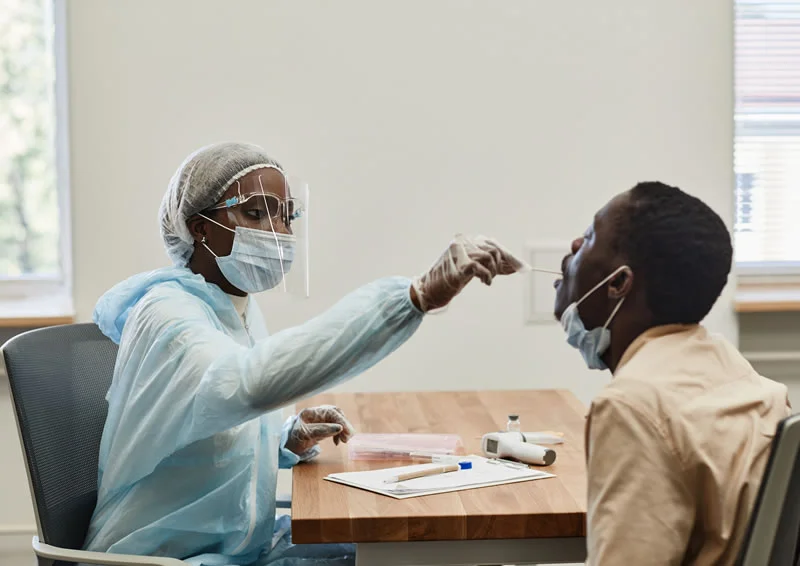NEWS & INSIGHTS: Global Public Health
In the dynamic and ever-evolving field of healthcare, the role of clinical epidemiology consulting has become increasingly vital in advancing healthcare outcomes in South Africa. With its focus on analyzing the patterns, determinants, and impacts of health and disease in populations, clinical epidemiology provides crucial insights that drive evidence-based decision-making and improve patient care. By applying rigorous research methodologies, statistical analysis, and data interpretation, clinical epidemiologists help healthcare organizations identify and address health disparities, optimize treatment strategies, and enhance the overall delivery of healthcare services. In a country like South Africa, where the healthcare landscape is marked by unique challenges and diverse population health needs, the contribution of clinical epidemiology consulting is particularly significant.
This article explores the multifaceted role of clinical epidemiology consulting in South Africa, highlighting its impact on public health initiatives, clinical practice, and health policy development. Join us as we delve into the fascinating world of clinical epidemiology and discover how it is shaping the future of healthcare in South Africa.
What is clinical epidemiology?
 Clinical epidemiology is a branch of epidemiology that focuses on the application of research methods to understand the distribution and determinants of health and disease in human populations. It involves the systematic collection, analysis, and interpretation of data to generate evidence that informs healthcare decision-making.
Clinical epidemiology is a branch of epidemiology that focuses on the application of research methods to understand the distribution and determinants of health and disease in human populations. It involves the systematic collection, analysis, and interpretation of data to generate evidence that informs healthcare decision-making.
Clinical epidemiologists play a crucial role in studying the impact of various factors on health outcomes, such as disease prevalence, risk factors, treatment effectiveness, and healthcare utilization. They utilize a range of research methodologies, including observational studies, randomized controlled trials, systematic reviews, and meta-analyses, to gather and analyze data.
The aim of clinical epidemiology is to provide evidence-based insights that contribute to improving healthcare practices and outcomes. By identifying patterns and trends in health and disease, clinical epidemiologists can guide healthcare organizations in making informed decisions that optimize patient care.
The need for clinical epidemiology consulting in South Africa
South Africa faces unique healthcare challenges, including a high burden of infectious diseases, socioeconomic disparities, and a diverse population with varying healthcare needs. These challenges necessitate the involvement of clinical epidemiology consulting to address the complex healthcare landscape effectively.
Clinical epidemiologists in South Africa play a critical role in conducting research that focuses on the specific health issues and population groups prevalent in the country. By analyzing local data and identifying health disparities, clinical epidemiology consulting helps healthcare organizations tailor interventions and allocate resources efficiently.
Additionally, clinical epidemiology consulting facilitates collaboration between healthcare providers, researchers, and policymakers to develop evidence-based strategies that address the specific healthcare needs of South Africa. The expertise of clinical epidemiologists in data analysis and interpretation assists in generating actionable insights that guide healthcare decision-making at all levels.
Benefits of clinical epidemiology consulting in healthcare
 The utilization of clinical epidemiology consulting in healthcare brings several notable benefits. Firstly, it enables healthcare organizations to make informed decisions based on evidence rather than assumptions or anecdotal information. By analyzing data, clinical epidemiologists can identify the most effective treatment strategies, interventions, and preventive measures, leading to improved patient outcomes.
The utilization of clinical epidemiology consulting in healthcare brings several notable benefits. Firstly, it enables healthcare organizations to make informed decisions based on evidence rather than assumptions or anecdotal information. By analyzing data, clinical epidemiologists can identify the most effective treatment strategies, interventions, and preventive measures, leading to improved patient outcomes.
Furthermore, clinical epidemiology consulting assists in the identification and monitoring of health disparities. By examining data across different population groups, clinical epidemiologists can identify groups that are disproportionately affected by certain diseases or have limited access to healthcare services. This knowledge helps in directing resources and interventions to address these disparities and reduce health inequities.
Clinical epidemiology consulting also contributes to cost-effective healthcare delivery. By analyzing healthcare utilization patterns and evaluating the effectiveness of interventions, clinical epidemiologists can identify areas where resources can be allocated more efficiently. This helps in optimizing healthcare expenditure and ensuring that limited resources are utilized to their maximum potential.
Case studies of successful clinical epidemiology consulting projects in South Africa
Several successful clinical epidemiology consulting projects in South Africa have demonstrated the impact of this field in advancing healthcare. One notable case study is the implementation of a comprehensive HIV prevention and treatment program in a high-prevalence region. Clinical epidemiologists conducted extensive research to identify the most effective combination of interventions, including testing strategies, antiretroviral therapy guidelines, and targeted outreach programs. The program resulted in a significant reduction in HIV transmission rates and improved access to treatment for affected individuals.
Another case study involved the evaluation of a vaccination campaign targeting a specific population group. Clinical epidemiologists conducted a thorough analysis of the campaign’s impact, including vaccine uptake rates, disease incidence, and cost-effectiveness. The findings of the study guided policymakers in refining the vaccination strategy, leading to increased immunization coverage and a decline in disease burden.
These case studies highlight the invaluable role of clinical epidemiology consulting in translating research findings into practical interventions that have a measurable impact on population health.
The role of clinical epidemiology consulting in improving patient outcomes
Clinical epidemiology consulting plays a crucial role in improving patient outcomes by providing evidence-based insights that inform clinical practice. By analyzing data on treatment effectiveness, adverse events, and patient outcomes, clinical epidemiologists help healthcare providers make informed decisions about the most appropriate interventions for their patients.
Clinical epidemiology consulting also contributes to the development of clinical guidelines and protocols. By synthesizing the available evidence, clinical epidemiologists can provide recommendations on the most effective diagnostic and treatment approaches for specific conditions. This ensures that healthcare providers follow standardized practices that are grounded in scientific evidence, leading to better patient outcomes and reduced practice variations.
Additionally, clinical epidemiology consulting supports the implementation of precision medicine approaches. By analyzing genetic and clinical data, clinical epidemiologists can identify subgroups of patients who are more likely to respond positively to specific treatments. This personalized approach to healthcare maximizes treatment effectiveness and minimizes adverse events.
Challenges and limitations of clinical epidemiology consulting in South Africa
While clinical epidemiology consulting brings immense value to healthcare in South Africa, it is not without its challenges and limitations. One of the primary challenges is the availability and quality of data. South Africa, like many other countries, faces issues related to data collection, accuracy, and completeness. Limited access to reliable data can hinder the ability of clinical epidemiologists to conduct robust analyses and generate accurate insights.
Another challenge is the need for capacity building in clinical epidemiology. South Africa requires a skilled workforce of clinical epidemiologists who can conduct research, analyze data, and communicate findings effectively. Investing in training programs and research infrastructure is crucial to address this challenge and build a sustainable clinical epidemiology workforce.
Furthermore, the translation of research findings into practice can be a complex process. Despite the availability of evidence, there may be barriers to implementation, such as limited resources, organizational resistance to change, and cultural factors. Overcoming these barriers requires collaboration between researchers, policymakers, and healthcare providers to ensure that evidence-based interventions are effectively implemented.
How to choose a clinical epidemiology consulting firm
Selecting the right clinical epidemiology consulting firm is essential to ensure the success of healthcare projects. When choosing a firm, consider the following factors:
1. Expertise and experience: Look for a firm with a team of experienced clinical epidemiologists who have a track record of successfully completing projects in South Africa. Assess their expertise in relevant research methodologies and their ability to analyze complex data sets.
2. Understanding of local context: A firm that understands the unique healthcare challenges and population health needs in South Africa will be better equipped to provide tailored solutions. Look for evidence of previous work in South Africa or similar settings.
3. Collaborative approach: Choose a firm that values collaboration and partnerships. Effective clinical epidemiology consulting requires close collaboration between the consulting firm, healthcare organizations, researchers, and policymakers. Look for a firm that emphasizes building strong relationships and fosters collaboration throughout the project.
4. Communication and reporting: Clear and effective communication is crucial in clinical epidemiology consulting. Ensure that the firm has a strong communication plan in place and provides regular updates and reports on project progress.
5. Cost-effectiveness: Consider the cost of the consulting services in relation to the expected outcomes and benefits. While cost should not be the sole determining factor, it is essential to find a firm that provides value for money.
Future trends in clinical epidemiology consulting in South Africa
The field of clinical epidemiology consulting is poised for significant growth and innovation in South Africa. With advancements in technology and the increasing availability of data, clinical epidemiologists can leverage big data analytics and artificial intelligence to generate even more precise and actionable insights. This will enable healthcare organizations to make more informed decisions and tailor interventions to the specific needs of individuals and populations.
Furthermore, there is a growing recognition of the importance of community engagement and participatory research in clinical epidemiology. Future trends in clinical epidemiology consulting in South Africa will likely focus on involving communities in research design, implementation, and interpretation. This participatory approach ensures that interventions are culturally appropriate, relevant, and sustainable.
Finally, the integration of clinical epidemiology with other disciplines, such as health economics, health informatics, and implementation science, will further enhance the impact of clinical epidemiology consulting. By combining expertise from different fields, comprehensive solutions can be developed that address the complex challenges in healthcare delivery.
Conclusion: The impact of clinical epidemiology consulting on healthcare in South Africa
Clinical epidemiology consulting plays a pivotal role in advancing healthcare in South Africa. By analyzing data, conducting research, and providing evidence-based insights, clinical epidemiologists contribute to improving patient outcomes, addressing health disparities, and optimizing healthcare delivery.
As South Africa continues to face unique healthcare challenges, the role of clinical epidemiology consulting will become increasingly crucial. By harnessing the power of data and research, clinical epidemiologists will continue to shape the future of healthcare in South Africa and drive evidence-based decision-making that improves the health and well-being of the population.
Together, let us embrace the potential of clinical epidemiology consulting and work towards a healthier South Africa for all.
Share This Post, Choose Your Platform!
In the dynamic and ever-evolving field of healthcare, the role of clinical epidemiology consulting has become increasingly vital in advancing healthcare outcomes in South Africa. With its focus on analyzing the patterns, determinants, and impacts of health and disease in populations, clinical epidemiology provides crucial insights that drive evidence-based decision-making and improve patient care. By applying rigorous research methodologies, statistical analysis, and data interpretation, clinical epidemiologists help healthcare organizations identify and address health disparities, optimize treatment strategies, and enhance the overall delivery of healthcare services. In a country like South Africa, where the healthcare landscape is marked by unique challenges and diverse population health needs, the contribution of clinical epidemiology consulting is particularly significant.
This article explores the multifaceted role of clinical epidemiology consulting in South Africa, highlighting its impact on public health initiatives, clinical practice, and health policy development. Join us as we delve into the fascinating world of clinical epidemiology and discover how it is shaping the future of healthcare in South Africa.
What is clinical epidemiology?
 Clinical epidemiology is a branch of epidemiology that focuses on the application of research methods to understand the distribution and determinants of health and disease in human populations. It involves the systematic collection, analysis, and interpretation of data to generate evidence that informs healthcare decision-making.
Clinical epidemiology is a branch of epidemiology that focuses on the application of research methods to understand the distribution and determinants of health and disease in human populations. It involves the systematic collection, analysis, and interpretation of data to generate evidence that informs healthcare decision-making.
Clinical epidemiologists play a crucial role in studying the impact of various factors on health outcomes, such as disease prevalence, risk factors, treatment effectiveness, and healthcare utilization. They utilize a range of research methodologies, including observational studies, randomized controlled trials, systematic reviews, and meta-analyses, to gather and analyze data.
The aim of clinical epidemiology is to provide evidence-based insights that contribute to improving healthcare practices and outcomes. By identifying patterns and trends in health and disease, clinical epidemiologists can guide healthcare organizations in making informed decisions that optimize patient care.
The need for clinical epidemiology consulting in South Africa
South Africa faces unique healthcare challenges, including a high burden of infectious diseases, socioeconomic disparities, and a diverse population with varying healthcare needs. These challenges necessitate the involvement of clinical epidemiology consulting to address the complex healthcare landscape effectively.
Clinical epidemiologists in South Africa play a critical role in conducting research that focuses on the specific health issues and population groups prevalent in the country. By analyzing local data and identifying health disparities, clinical epidemiology consulting helps healthcare organizations tailor interventions and allocate resources efficiently.
Additionally, clinical epidemiology consulting facilitates collaboration between healthcare providers, researchers, and policymakers to develop evidence-based strategies that address the specific healthcare needs of South Africa. The expertise of clinical epidemiologists in data analysis and interpretation assists in generating actionable insights that guide healthcare decision-making at all levels.
Benefits of clinical epidemiology consulting in healthcare
 The utilization of clinical epidemiology consulting in healthcare brings several notable benefits. Firstly, it enables healthcare organizations to make informed decisions based on evidence rather than assumptions or anecdotal information. By analyzing data, clinical epidemiologists can identify the most effective treatment strategies, interventions, and preventive measures, leading to improved patient outcomes.
The utilization of clinical epidemiology consulting in healthcare brings several notable benefits. Firstly, it enables healthcare organizations to make informed decisions based on evidence rather than assumptions or anecdotal information. By analyzing data, clinical epidemiologists can identify the most effective treatment strategies, interventions, and preventive measures, leading to improved patient outcomes.
Furthermore, clinical epidemiology consulting assists in the identification and monitoring of health disparities. By examining data across different population groups, clinical epidemiologists can identify groups that are disproportionately affected by certain diseases or have limited access to healthcare services. This knowledge helps in directing resources and interventions to address these disparities and reduce health inequities.
Clinical epidemiology consulting also contributes to cost-effective healthcare delivery. By analyzing healthcare utilization patterns and evaluating the effectiveness of interventions, clinical epidemiologists can identify areas where resources can be allocated more efficiently. This helps in optimizing healthcare expenditure and ensuring that limited resources are utilized to their maximum potential.
Case studies of successful clinical epidemiology consulting projects in South Africa
Several successful clinical epidemiology consulting projects in South Africa have demonstrated the impact of this field in advancing healthcare. One notable case study is the implementation of a comprehensive HIV prevention and treatment program in a high-prevalence region. Clinical epidemiologists conducted extensive research to identify the most effective combination of interventions, including testing strategies, antiretroviral therapy guidelines, and targeted outreach programs. The program resulted in a significant reduction in HIV transmission rates and improved access to treatment for affected individuals.
Another case study involved the evaluation of a vaccination campaign targeting a specific population group. Clinical epidemiologists conducted a thorough analysis of the campaign’s impact, including vaccine uptake rates, disease incidence, and cost-effectiveness. The findings of the study guided policymakers in refining the vaccination strategy, leading to increased immunization coverage and a decline in disease burden.
These case studies highlight the invaluable role of clinical epidemiology consulting in translating research findings into practical interventions that have a measurable impact on population health.
The role of clinical epidemiology consulting in improving patient outcomes
Clinical epidemiology consulting plays a crucial role in improving patient outcomes by providing evidence-based insights that inform clinical practice. By analyzing data on treatment effectiveness, adverse events, and patient outcomes, clinical epidemiologists help healthcare providers make informed decisions about the most appropriate interventions for their patients.
Clinical epidemiology consulting also contributes to the development of clinical guidelines and protocols. By synthesizing the available evidence, clinical epidemiologists can provide recommendations on the most effective diagnostic and treatment approaches for specific conditions. This ensures that healthcare providers follow standardized practices that are grounded in scientific evidence, leading to better patient outcomes and reduced practice variations.
Additionally, clinical epidemiology consulting supports the implementation of precision medicine approaches. By analyzing genetic and clinical data, clinical epidemiologists can identify subgroups of patients who are more likely to respond positively to specific treatments. This personalized approach to healthcare maximizes treatment effectiveness and minimizes adverse events.
Challenges and limitations of clinical epidemiology consulting in South Africa
While clinical epidemiology consulting brings immense value to healthcare in South Africa, it is not without its challenges and limitations. One of the primary challenges is the availability and quality of data. South Africa, like many other countries, faces issues related to data collection, accuracy, and completeness. Limited access to reliable data can hinder the ability of clinical epidemiologists to conduct robust analyses and generate accurate insights.
Another challenge is the need for capacity building in clinical epidemiology. South Africa requires a skilled workforce of clinical epidemiologists who can conduct research, analyze data, and communicate findings effectively. Investing in training programs and research infrastructure is crucial to address this challenge and build a sustainable clinical epidemiology workforce.
Furthermore, the translation of research findings into practice can be a complex process. Despite the availability of evidence, there may be barriers to implementation, such as limited resources, organizational resistance to change, and cultural factors. Overcoming these barriers requires collaboration between researchers, policymakers, and healthcare providers to ensure that evidence-based interventions are effectively implemented.
How to choose a clinical epidemiology consulting firm
Selecting the right clinical epidemiology consulting firm is essential to ensure the success of healthcare projects. When choosing a firm, consider the following factors:
1. Expertise and experience: Look for a firm with a team of experienced clinical epidemiologists who have a track record of successfully completing projects in South Africa. Assess their expertise in relevant research methodologies and their ability to analyze complex data sets.
2. Understanding of local context: A firm that understands the unique healthcare challenges and population health needs in South Africa will be better equipped to provide tailored solutions. Look for evidence of previous work in South Africa or similar settings.
3. Collaborative approach: Choose a firm that values collaboration and partnerships. Effective clinical epidemiology consulting requires close collaboration between the consulting firm, healthcare organizations, researchers, and policymakers. Look for a firm that emphasizes building strong relationships and fosters collaboration throughout the project.
4. Communication and reporting: Clear and effective communication is crucial in clinical epidemiology consulting. Ensure that the firm has a strong communication plan in place and provides regular updates and reports on project progress.
5. Cost-effectiveness: Consider the cost of the consulting services in relation to the expected outcomes and benefits. While cost should not be the sole determining factor, it is essential to find a firm that provides value for money.
Future trends in clinical epidemiology consulting in South Africa
The field of clinical epidemiology consulting is poised for significant growth and innovation in South Africa. With advancements in technology and the increasing availability of data, clinical epidemiologists can leverage big data analytics and artificial intelligence to generate even more precise and actionable insights. This will enable healthcare organizations to make more informed decisions and tailor interventions to the specific needs of individuals and populations.
Furthermore, there is a growing recognition of the importance of community engagement and participatory research in clinical epidemiology. Future trends in clinical epidemiology consulting in South Africa will likely focus on involving communities in research design, implementation, and interpretation. This participatory approach ensures that interventions are culturally appropriate, relevant, and sustainable.
Finally, the integration of clinical epidemiology with other disciplines, such as health economics, health informatics, and implementation science, will further enhance the impact of clinical epidemiology consulting. By combining expertise from different fields, comprehensive solutions can be developed that address the complex challenges in healthcare delivery.
Conclusion: The impact of clinical epidemiology consulting on healthcare in South Africa
Clinical epidemiology consulting plays a pivotal role in advancing healthcare in South Africa. By analyzing data, conducting research, and providing evidence-based insights, clinical epidemiologists contribute to improving patient outcomes, addressing health disparities, and optimizing healthcare delivery.
As South Africa continues to face unique healthcare challenges, the role of clinical epidemiology consulting will become increasingly crucial. By harnessing the power of data and research, clinical epidemiologists will continue to shape the future of healthcare in South Africa and drive evidence-based decision-making that improves the health and well-being of the population.
Together, let us embrace the potential of clinical epidemiology consulting and work towards a healthier South Africa for all.




